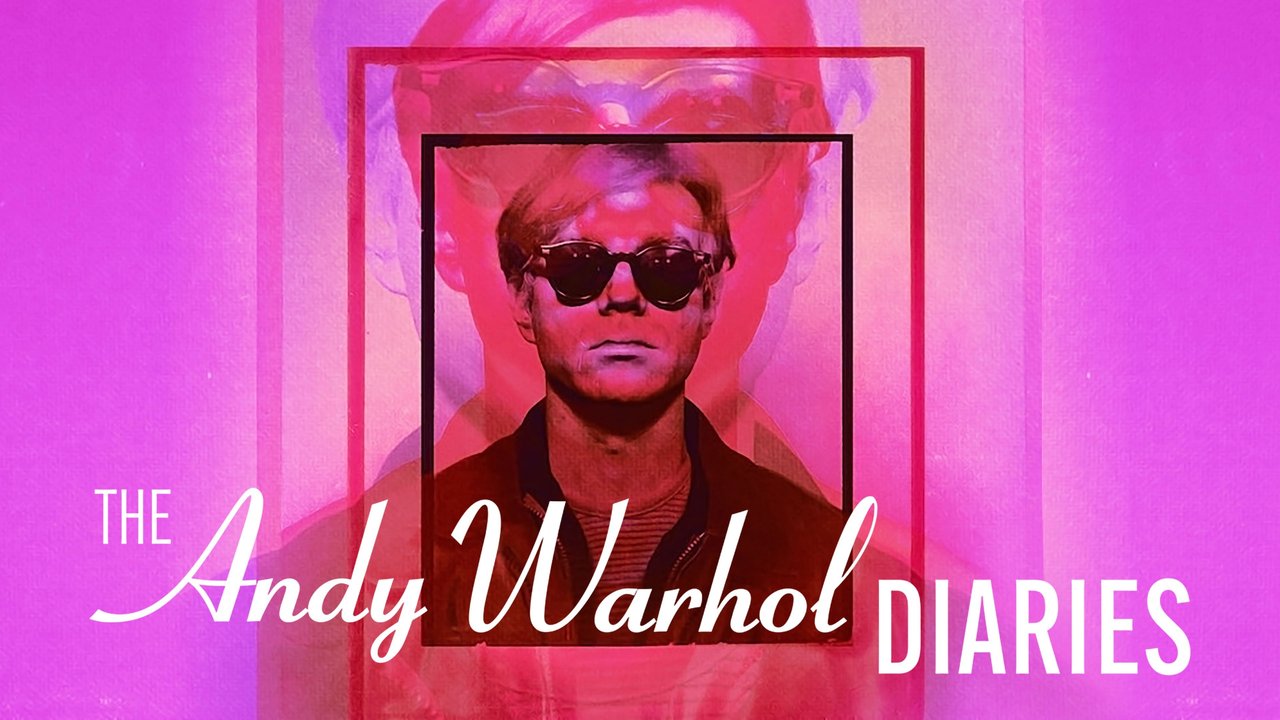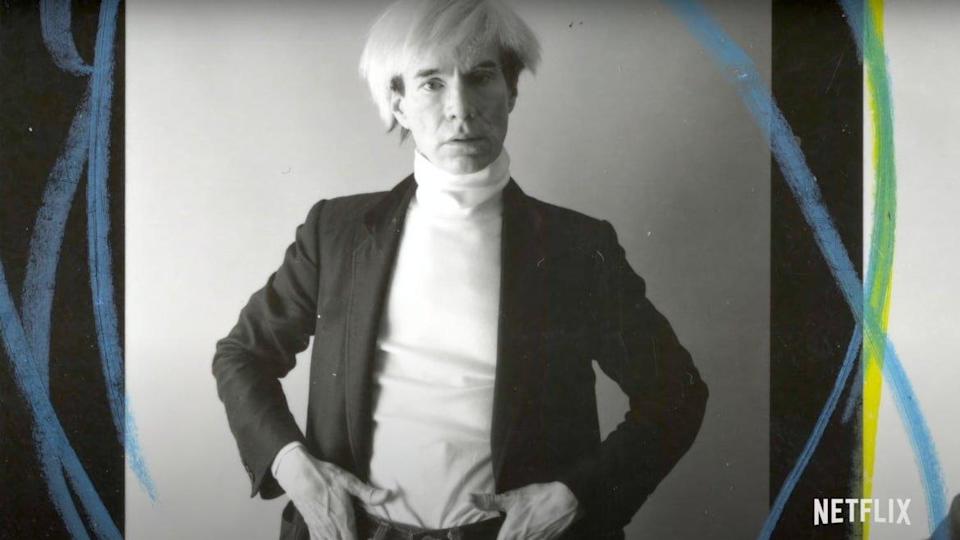Doc Corner: 'The Andy Warhol Diaries' on Netflix
 Thursday, March 17, 2022 at 8:00PM
Thursday, March 17, 2022 at 8:00PM By Glenn Dunks

There have been a lot of films, series and books about Andy Warhol and the company he kept. Documentaries alone, I could definitely list off a dozen titles by heart from prestige to the trash. And there's no reason for that to stop now. After all, Warhol’s factory of superstars and the art they produced will no doubt continue to inspire other creatives for as long as there is art. The Andy Warhol Diaries on Netflix will certainly not be the last. Although it may just go down as at least one of the more definitive of the bunch—as well as the slickest...
I tend to gravitate to this subject matter. It’s what made me such an easy mark for Todd Haynes’ The Velvet Underground just a few months ago. It helps of course that so much Andy Warhol’s his life was documented by others and by the man himself. All while remaining seemingly entirely unknowable; a very modern existence that makes him perfect for repeated dissection by other artists.
Warhol was of course a strange product of America’s obsession with fame. Not simply famous for being famous (far from it), but a harbinger or a society eager to peak behind the veil of celebrity and claim their own slide no matter how. He was one of the most famous people of the 20th century, at the forefront of so many trends that he was able to burst through the anti-intellectual barriers of society by making art that many didn’t even considering to be art in the first place. He bought a unique sense of queerness to the mainstream, too, although he’d hardly admit it for Catholic guilt.

This six-part series is directed by Andrew Rossi, whose earlier works Page One and The First Monday in May are both about similar ecosystems. Produced through Ryan Murphy’s Netflix deal, this is easily the best such production. Taking its title from Pat Hackett’s posthumously release book of the same name, The Diaries of Andy Warhol explores his (predominantly) post-Factory life, utilising Bill Irwin via an AI voice simulation to conjure the spectre of Warhol himself over the proceedings, reciting passages from his diaries revolving around his emotional (and sexual?) partners, his art, his religion, his anxieties and his legacy following his death in 1987.
I guess this brings up one of the reasons that The Andy Warhol Diaries is so good. By using this book, transcribed from Warhol’s own recordings, it is still incredibly difficult to understand him. We can watch six hours with incredibly thorough dives into his private, personal life and yet still never know whether he was even telling the truth about all of it. Rossi knows this, too. He plays with these ideas in amusing ways, fusing what we know, what we think we know, what we never knew and blending it into something that is maybe true? Right down to the beautifully designed opening credits where blocks illustrated with Andy’s face shift position only to seemingly end up where you thought they were originally. Like a game of three-card monte, we will never know what is or isn't a ruse, and that is entirely part of the point.
What does feel like a besides-the-point choice is the series’ use of faux celluloid filters throughout. Distracting because unlike Haynes’ 2021 doc, the interview portions of The Andy Warhol Diaries are not actually shot in 16mm. The flickering dust marks, exposure flares and sprocket holes are a minor annoyance, sure, but a rather superficial one that exposes Rossi somewhat as somebody approximating an aesthetic rather than fully realizing one. It’s unnecessary, too, given that it more broadly makes often fabulous use of archival footage and film clips as a scene-setting device that does work, placing Warhol and his circle of interview subjects within an artistic world captured on film rather than a lazy reproduction of it. For example, Martin Scorsese’s After Hours pops up throughout. As does Edo Bertoglio’s exquisite Jean-Michel Basquiat documentary Downtown 81.
Basquiat is a prominent figure in the final episodes, opening Warhol’s art to even deeper examination. In fact, maybe the best thing Rossi and editor Steven Ross allow for in its expanded runtime is the actual discussion of art. You’d be forgiven for thinking that was a fairly standard part of any artist’s bio-doc, but it’s actually quite rare to see the sort of deep dives into his work as we see here with works like his Last Supper series. It is especially rare given not all of it is positive. Uncommon is a film that will take its subject to task for commercial racism as this one does with his now famed ‘drag queen’ series (featuring the now revered Marsha P. Johnson). Or similarly the way it admits fault in how Warhol responded to the AIDS crisis even as those he knew and loved around him died of the disease. Where documentary series often feel dragged out into an episodic structure for no real reason beyond streaming commercialisation, The Andy Warhol Diaries uses almost every moment of its six episodes to luxuriate in his world and bring viewers into the good, the bad and the ugly.
That being said, this probably isn’t the best starting place for those entirely new to Warhol. Despite an early life crash course, his Factory era with the soup cans, Double Elvis, The Velvet Underground, Edie Sedwick and films like My Hustler, Chelsea Girls and Blowjob is largely skimmed over or discussed in reference to later eras and works. It largely takes shape from his shooting in 1968 and his later years spent chasing relevance, money and self-satisfaction with his body and his art in the shadow of a shifting and increasingly technological America.
Warhol was always throwing people off and saying things to build an image of what he wanted people to see. Is all of what we have seen and heard here even accurate? Who can ever really know? Amusingly, it ends with David Bowie’s “Loving the Alien”. Bowie, after all, portrayed Warhol in Julian Schnabel’s Basquiat biopic. Just another nod in a series that is really smart and mostly well executed with a great selection of talking heads who knew Andy personally (including the few famous ones, like Schnabel, John Waters and Rob Lowe). Its final moments are especially affecting, making for a fitting tribute within a series that so delicately balances reverence with interrogation.
Release: Currently streaming globally on Netflix.
Award chances: Andy Warhol and that era is a strange one. Works about it always feel like they should be awards magnates, yet they rarely are. I’d like to think this could find some Emmy love, but I’m not sure this is the sort of thing they typically reward in the documentary categories.
 Andy Warhol,
Andy Warhol,  Bill Irwin,
Bill Irwin,  Doc Corner,
Doc Corner,  Netflix,
Netflix,  Review,
Review,  documentaries
documentaries 


Reader Comments (3)
Andy Warhol looks a scream
Hang him on my wall
Andy Warhol, Silver Screen
Can't tell them apart at all
The opening sequence, the closing songs, the amount of footage, the footnotes, Bill Irwin's voice-over... I can't stress enough how much I absolutely loved and cherished every single second of this series.
I thought this was GREAT which surprised me given the provenance. Felt like i was learning new things about him which is pretty rare at this stage.